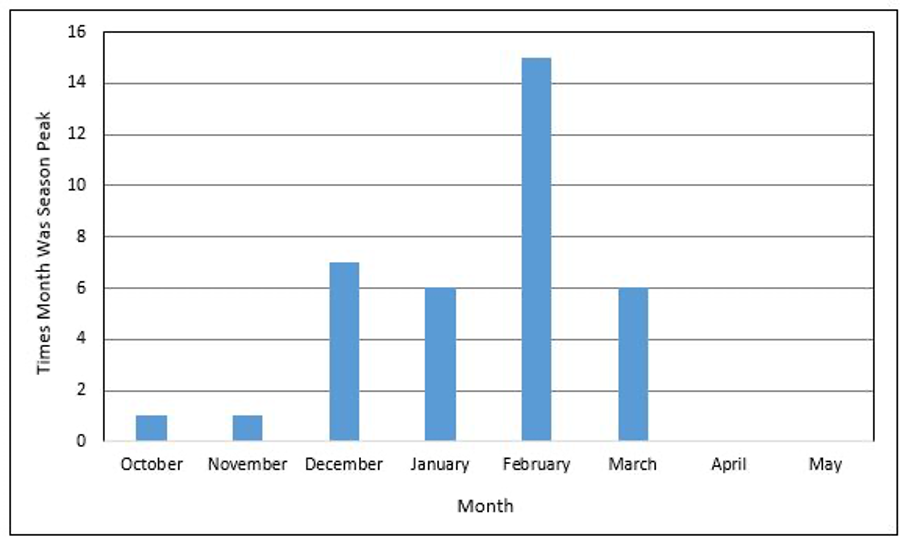 Guess what? It’s flu season. Yep, that’s right. You may have thought that COVID canceled out the flu, but sadly, it’s still up to no good. One positive thing though, is that it seems the wearing of masks and quarantining is decreasing the spread of the flu, according to the CDC.
Guess what? It’s flu season. Yep, that’s right. You may have thought that COVID canceled out the flu, but sadly, it’s still up to no good. One positive thing though, is that it seems the wearing of masks and quarantining is decreasing the spread of the flu, according to the CDC.
COVID has given us a healthy paranoia of spreading illness, or maybe it’s the stink eye we’re given if we sneeze while picking up milk at the store. Regardless, keep washing those hands and using hand sanitizer!
When is peak flu season?
The CDC provided this figure below for the United States showing that historically, February seems to be when most flu activity peaks. This figure is reporting data for the 1982-2018 flu seasons. You can certainly catch the flu at any time during the year, but clearly, the possibility greatly increases from December through March.
It will be interesting to see if this changes because there is a great decrease in close contact due to COVID-19 restrictions.

Source: Flu CDC Season Summary 2021
How do you know if you have the flu or COVID-19?
The CDC website lays out clear differentiators between COVID-19 and the flu.
“Influenza (Flu) and COVID-19 are both contagious respiratory illnesses, but they are caused by different viruses. COVID-19 is caused by infection with a new coronavirus (called SARS-CoV-2) and flu is caused by infection with influenza viruses. Because some of the symptoms of flu and COVID-19 are similar, it may be difficult to tell the difference between them based on symptoms alone, and testing may be needed to help confirm a diagnosis. Flu and COVID-19 share many characteristics, but there are some key differences between the two.”
What are some symptoms of the flu?
- Fatigue is often the first and most noticeable symptom.
- Temperature of 100°F and above, lasting 3-4 days.
- Chills
- Headache
- Dry persistent cough
- Sore throat
- Muscle pain and body aches
If you have a fever, you should always stay home up to 24 hours after your un-treated fever goes away. It’s best to contact your doctor if you are experiencing symptoms. Impact members can set up a virtual appointment for free.
It is possible to contract the flu from touching a contaminated surface; however, this is less likely. People are typically contagious beginning the day before they develop symptoms and 5-7 days after symptom onset. This differs from a case of COVID-19, where an individual may be contagious for 14 days.
Can I prevent the flu?
Following a routine that will boost or strengthen your immune system can help prevent the flu.
- Avoid close contact with others.
- Stay home when you are sick.
- Cover your mouth and nose.
- Exercise
- Take a multivitamin.
- Maintain a healthy diet.
- Get enough sleep (7-9 hours).
- Wash hands with soap and water.
- Clean and disinfect surfaces and objects that may be contaminated.
- Cover coughs and sneezes with a tissue or inside of elbow.
Foods that boost or strengthen your immune system.
- Peppers and citrus. What do peppers and citrus fruits have in common? Vitamin C.
- These humble little fruits are also immune-boosting superfoods.
- Green tea
- Mushrooms
- Almonds
- Cruciferous vegetables

If you think citrus fruits have the most vitamin C of any fruit or vegetable, think again. Ounce for ounce, red bell peppers contain almost 3 times as much vitamin C as a Florida orange. They’re also a rich source of beta carotene. Besides boosting your immune system, vitamin C may help you maintain healthy skin.
What should I eat if I have the flu?
- Broth helps prevent dehydration and the warm elements can help soothe a sore throat and relieve congestion.
- Chicken soup combines the benefits of broth, along with additional ingredients that may encourage healing. Cut-up chicken provides your body with iron and protein, and you’ll also gain nutrients from carrots, herbs and celery, so don’t leave them out!
- Garlic – Due to the immune-enhancing effects, consider eating garlic at the first signs of the flu.
- Vitamin C foods – Bell peppers and citrus fruits are high in vitamin C and your body can absorb them quicker than taking a supplement.
- Leafy greens – Greens have both vitamin C and vitamin E, another immune-enhancing nutrient. So, drink a smoothie or eat them raw with some olive oil.
- Oatmeal – A warm bowl of oatmeal can be a soothing, nutritious food choice. Oatmeal, like other whole grains, is also a natural source of immune-boosting vitamin E. It contains thiamine, magnesium, phosphorus, zinc, manganese, selenium, and iron.
Don’t bypass how important it is to also stay hydrated. It’s easy to get dehydrated when you are suffering from the flu. Not only do you eat and drink less and have an overall reduced water intake, but you also lose water with sweat when you have a fever.
Fluids are important for your body functions in general, but they can also help break up congestion and stave off infections. So, keep sipping water as often as you can.
Foods to avoid.
- Alcohol lowers your immune system and causes dehydration.
- Caffeinated beverages. Coffee, black tea, and soda can make you more dehydrated and typically contain sugar.
- Hard or jagged foods. Crunchy crackers, chips, and foods with similar textures can aggravate cough and sore throat.
- Processed foods. The more processed a food is, the fewer nutrients you’ll get. With the flu, your body is trying to heal itself, so it’s important to support the process with whole, nutritious foods.
Eating the right foods and staying hydrated is important to help you get over the flu.
Your recovery may be longer if you develop a secondary infection from the flu. As a rule of thumb, you should stay hydrated and make your best effort to eat flu-friendly foods until your symptoms go away and your appetite returns to normal.
If you need healthcare before the flu season peaks, Impact Health Sharing is a great choice for those looking to save money and be a part of a community. With low prices and a friendly staff, Impact offers more than just healthcare. Members enjoy $0 provider fee for telehealth visits, a community that cares, and the option of keeping the doctors you love and trust.
Check out our previous blog that explains the importance of having an annual checkup.
Get a free quote from one of our helpful representatives. We promise not to be pushy or spam you with unwanted calls!


